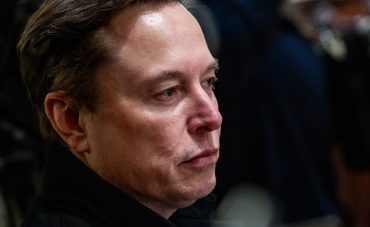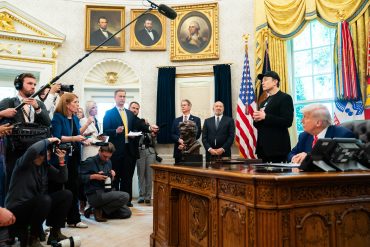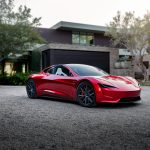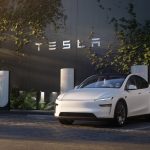
- EVs & Aerospace
- Executive Strategy
- Government Contracts
Elon Musk Shelves Third-Party Plans to Protect Tesla and SpaceX
6 minute read

Tesla CEO abandons third-party political movement to protect government contracts and business relationships worth billions
Key Takeaways
- Musk scales back America Party plans to preserve relationships with top Republicans, particularly potential 2028 presidential contender JD Vance, as political ventures risk distracting from core business operations at Tesla and SpaceX.
- $250 million campaign investment at risk as Musk’s support for Trump’s 2024 campaign faces potential losses from subsequent policy changes that threaten Tesla’s revenue streams through reduced clean energy subsidies.
- Tesla shares recover slightly after initial decline following America Party announcement, with stock trading down 0.7% in aftermarket hours compared to steeper earlier losses as investor concerns about executive focus ease.
Introduction
Elon Musk retreats from his ambitious plans to launch the America Party, a proposed third-party political movement that would have challenged the traditional two-party system. The Tesla CEO now tells allies he prefers concentrating on his companies rather than risk alienating powerful Republican figures who could impact his business interests.
This strategic pivot comes after Musk initially floated the America Party concept in July, targeting voters dissatisfied with both major political parties. The decision reflects growing concerns among tech executives about the business risks of direct political engagement, particularly when government contracts and regulatory relationships remain crucial to company operations.
Key Developments
Musk’s political ambitions emerged from his opposition to what he termed the “Big, Beautiful Bill,” legislation that would cut federal support for clean energy and electric vehicles. He argued the bill would “cause immense strategic harm” through projected trillion-dollar debt increases.
The America Party proposal gained initial traction on X, Musk’s social media platform, where he conducted polls showing 65.4% support for a new political party. He positioned the movement to represent the “80% in the middle,” appealing to politically independent voters who comprise a larger segment than either major party.
Despite early momentum, Musk made limited progress establishing formal party infrastructure. No Federal Election Commission filings materialized, and concrete policy platforms remained largely undefined beyond general themes of government spending cuts and deregulation.
The scaling back accelerates as Musk maintains contact with Vice President JD Vance, who recently expressed hope that Musk would return to the Republican fold. Musk recognizes that launching a competing party could damage this relationship and others with influential Republicans.

Market Impact
Tesla shares initially declined following Musk’s America Party announcement, reflecting investor concerns about executive distraction from core business priorities. The stock recovered partially after reports of the scaled-back political plans, trading down 0.7% in aftermarket hours compared to steeper earlier losses.
Treasury Secretary Scott Bessent publicly noted that company boards would prefer Musk to “focus on his business activities, not his political activities.” This sentiment reflects broader market concerns about political ventures diluting leadership attention and potentially affecting shareholder confidence.
SpaceX maintains over $4 million in lobbying expenditures and crucial federal contracts with NASA and the Defense Department. The company’s business model depends heavily on government relationships that could face disruption from political conflicts.
Strategic Insights
The retreat highlights the precarious intersection between tech business models and government policy, especially for companies reliant on federal subsidies or contracts. Musk’s experience demonstrates how political activism can create financial risks that outweigh potential policy benefits.
Clean energy and electric vehicle sectors remain particularly vulnerable to political shifts, as evidenced by legislative threats to federal support programs that directly impact Tesla’s bottom line. This vulnerability pushes companies toward diversified business models less dependent on government incentives.
The episode reveals structural barriers facing tech leaders who seek direct political influence. Ballot access laws and entrenched two-party dominance create formidable obstacles that online influence cannot easily overcome.
Traditional lobbying approaches prove more sustainable than direct political competition. SpaceX’s established Washington presence, including significant lobbying investments, provides influence without the risks associated with partisan political movements.
Expert Opinions and Data
Nick Beauchamp, associate professor of political science at Northeastern University, describes third-party success as “almost inconceivable” in the current U.S. political system. He emphasizes that structural barriers, rather than individual candidate limitations, prevent new parties from gaining traction.
“The problem isn’t Musk specifically, but the reality of America’s political system,” Beauchamp explains, noting that ballot access requirements and campaign finance rules systematically favor existing parties.
Polling data supports appetite for political alternatives, with 58% of U.S. adults indicating that a third party is needed, according to October 2024 surveys. However, this sentiment has not translated into successful third-party movements historically.
Tesla approved a $29 billion pay package for Musk despite recent challenges in autonomous driving and robotics ventures. This compensation reflects board confidence in his business leadership while potentially encouraging focus on corporate rather than political activities.
Conclusion
Musk’s strategic retreat from the America Party reflects the high business risks and limited upside for tech executives engaging directly in partisan politics. The decision preserves crucial Republican relationships while allowing renewed focus on Tesla and SpaceX operations during challenging market conditions.
The episode underscores tech industry dependence on stable regulatory environments and demonstrates the challenges of translating social media influence into real-world political power. For now, traditional lobbying and government relations remain more effective tools for tech leaders seeking policy influence without jeopardizing core business interests.








